Roger Rogerson was Australia’s most notorious killer cop – and he didn’t care who knew it. Read the chilling inscription he signed in his memoir The Dark Side as he bragged about his murderous exploits
Roger Rogerson had a pair of schooners at the Evening Star Hotel in Sydney’s Surry Hills when this reporter asked to sign a copy of his book.
Rogerson, who relished his public image as a hard man, liked to add a personal touch with such inscriptions and was not concerned about offending any audience.
At a luncheon at the Chinese Cultural Club years earlier, he amused himself by signing a title page for an Asian man: “Best wishes, Loger Logerson.”
On this occasion in May 2010, the infamous old detective asked for information about who would receive The Dark Side, a memoir about his time chasing down crooks.
Rogerson wasted no time when told it would be a gift for a country cousin who appreciated true crime stories and was an avid sports shooter.
Roger Rogerson often bragged about the thugs he killed during his years as a Sydney detective. He is pictured center on the speaking circuit with late Melbourne criminal and author Mark ‘Chopper’ Read (right) and former AFL player Mark ‘Jacko’ Jackson
“Dear Paddy,” he began.
‘They told me you were a pretty good shot! But were you as good as me! Three shots, three men dead. All in the past. I hope you enjoy reading it.’
Those three dead men were drug dealer Warren Lanfranchi and armed robbers Phillip Western and Lawrence “Butchy” Byrne.
Rogerson certainly shot Lanfranchi, but probably not Western and, if he was not solely responsible for Byrne’s demise, he was happy to take credit.
Four years after the book signing and for the rest of his life, Rogerson would deny shooting drug dealer Jamie Gao in one of Sydney’s most inept underworld murders.
Rogerson, who died Sunday while serving a life sentence for Gao’s murder, has been publicly and privately accused of taking other lives over the years.
He had more motive than most to have sex worker Sallie-Anne Huckstepp murdered in 1986, a crime usually blamed on the late gangster Neddy Smith.
Huckstepp had been Lanfranchi’s lover and Smith claimed until his death that he and Rogerson were working together in a criminal partnership.
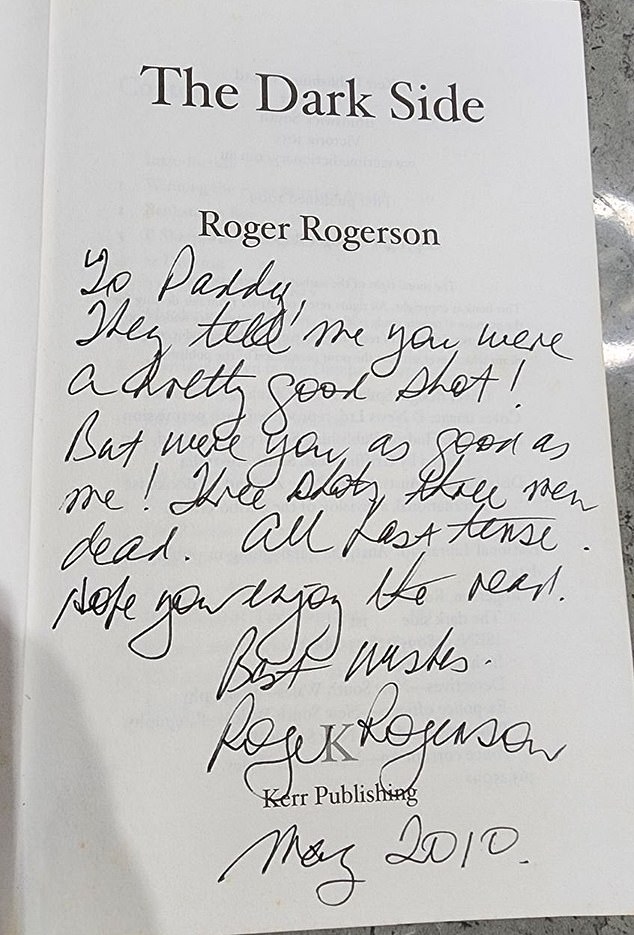
Rogerson signed a copy of his book The Dark Side with the inscription: ‘They tell me you were a pretty good shot! But were you as good as me! Three shots, three men dead. All in the past. I hope you enjoy reading it’
Rogerson always denied killing Huckstepp or anyone else, but enjoyed killing outlaws during his military service – whether he actually fired the fatal shots or not.
As a member of the Special Weapons and Operations Squad, Rogerson was regularly called upon to participate in the arrest of dangerous offenders in the 1970s.
In June 1976, he was with a SWOS team that surrounded a house at Avoca Beach on the Central Coast to capture Western, a bank robber and prison escapee.
When Western tried to flee, the SWOS opened fire and killed him.
“We all shot and we blew his head off,” Rogerson said later, but some colleagues’ recollections differ.
In February 1978, the Armed Hold-Up Squad received a tip-off that Byrne and two other men were going to rob the South’s Juniors League club in Kingsford of its income.
A shootout ensued on Anzac Parade with Rogerson and other detectives, armed with 12 gauge shotguns and .38 revolvers, shooting at the ambushed criminals.
Byrne was murdered, but not necessarily by Rogerson. That didn’t stop him from claiming this as a new step in his pump action Remington 870.
Rogerson was the most celebrated police officer in NSW and his network of criminal informants and police contacts spread across the country, especially in Victoria and Queensland.
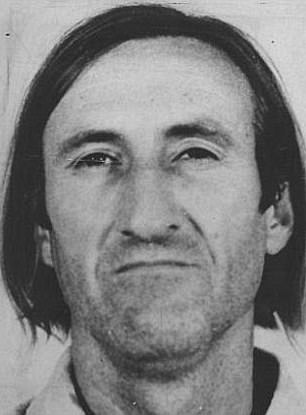
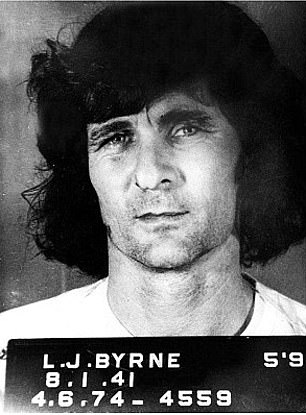
Roger Rogerson was present when police shot dead Phillip Western (left) at Avoca Beach on the NSW Central Coast in June 1976 and Lawrence ‘Butchy’ Byrne in Kingsford in February 1978.
There is no doubt who murdered Lanfranchi in Chippendale’s Dangar Place in June 1981, whether he was shot dead in cold blood or during a lawful arrest.
Smith, who took Lanfranchi to Rogerson that day, later said Lanfranchi went along to pay the detective a $10,000 bribe.
Rogerson said he was forced to shoot Lanfranchi twice when he pulled a gun.
A coronial inquest found that Rogerson shot Lanfranchi while trying to arrest him, but not that he acted in self-defense.
Huckstepp’s girlfriend Lyn Woodward had suspected evidence that Lanfranchi had gone to the meeting unarmed, but she disappeared hours after her first appearance at the inquest and was never seen again.
Smith had given the coroner evidence favorable to Rogerson and would claim he was subsequently given a ‘green light’ to commit armed robberies and other crimes.
Rogerson’s reputation as the NSW Police force’s brightest star was at least waning by then. It would never recover from what happened next.
On June 6, 1984, Drug Squad Detective Michael Drury was shot through the kitchen window of his Chatswood home.
Drury had infiltrated a drug syndicate in Melbourne through Sydney-based dealers Jack Richardson and Frank Avery, who led him to major southern player Alan Williams.
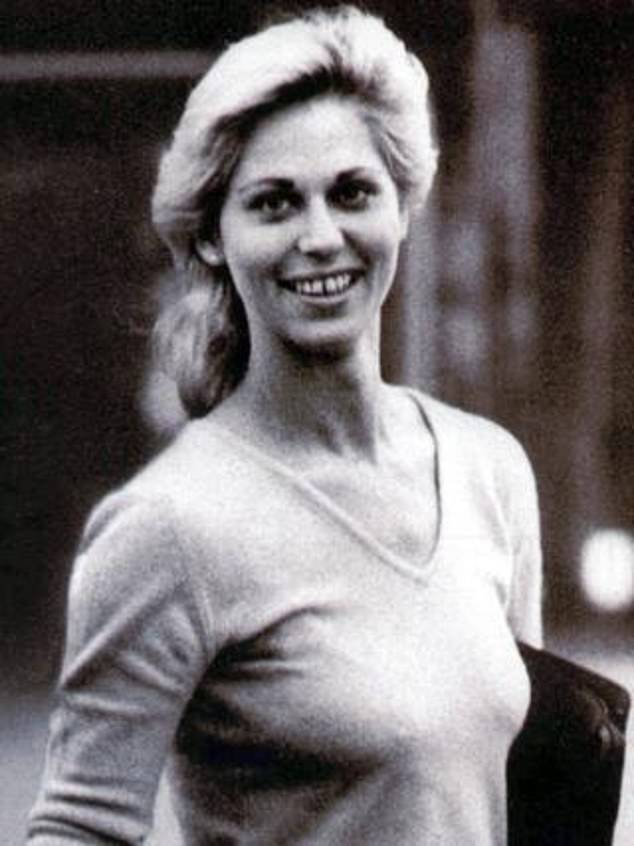
Rogerson had more motive than most for the 1986 murder of sex worker Sallie-Anne Huckstepp, a crime usually blamed on the late gangster Neddy Smith. Huckstepp is pictured
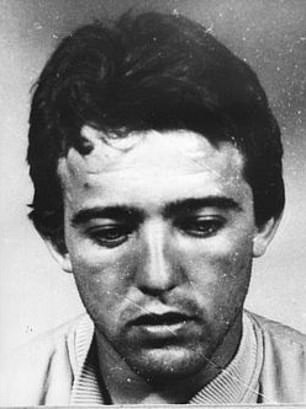
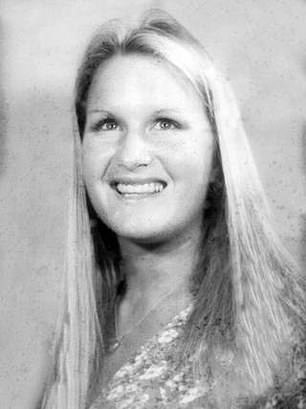
Rogerson shot and killed drug dealer Warren Lanfranchi (left) in June 1981. His friend Lyn Woodward (right) was due to testify at a coronial inquest into Lanfranchi’s death, but disappeared
In a final statement, Drury said he had refused bribes from Rogerson to change his evidence in Williams’ prosecution.
By then, Avery had already been found dead of a heroin overdose – police believed it was a “hotshot” – and Richardson had been shot dead.
Williams would testify that he paid Chris Flannery to kill Drury at Rogerson’s behest.
Rogerson was charged with attempted bribery and conspiracy to murder Drury, but was ultimately acquitted.
Flannery left his city apartment for the last time in May 1985 and hasn’t been back since. Rogerson denied having anything to do with his disappearance.
Huckstepp, who had publicly accused Rogerson of murdering her boyfriend Lanfranchi, was found floating in Centennial Park in February 1986.
Rogerson had been suspended since the Drury investigation and was dismissed from the NSW Police in April the same year.
From then on and for the next few decades, Rogerson’s name was almost always prefixed with “disgraced former detective” – but his downfall was not complete.
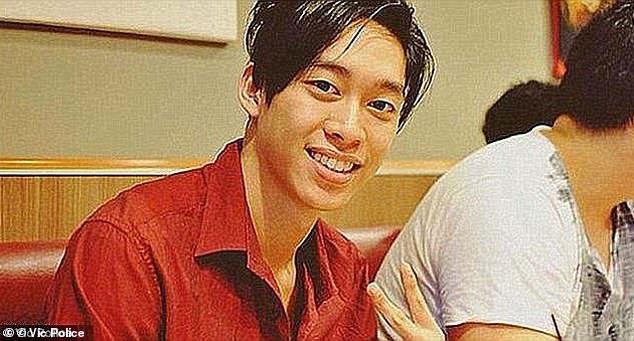
Drug dealer Jamie Gao (above) was shot dead by Rogerson or fellow former detective Glen McNamara in a warehouse in Padstow in 1994
In May 2014, Rogerson and former colleague Glen McNamara were filmed entering a storage facility with Gao. Three men entered, two men left.
While trying to steal nearly 10 pounds (4 kg) of ice from Gao, Rogerson or McNamara shot him twice in the chest.
Both were found guilty of murder and sentenced to life in prison in September 2016.
McNamara claimed that Rogerson once said of Huckstepp: ‘f*** me, she had to go’, and that he was terrified of him.
Smith, who was acquitted of Huckstepp’s murder in 1999, was also acquitted of the murders of drug dealers Lewton Shu (1983), Danny Chubb (1984), Barry Croft and Barry McCann (both 1987) and Bruce Sandery (1988).
He died in Long Bay Prison in September 2021 while serving a life sentence for the murders of brothel owner Harvey Jones in 1983 and two-truck driver Ronald Flavell in 1987.
Rogerson suffered a brain aneurysm in the same prison on Thursday and died in the Prince of Wales Hospital on Sunday evening. He was 83.
